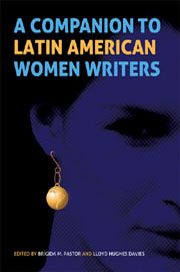Book contents
- Frontmatter
- Contents
- Introduction: The Feminine Voice in Latin American Literature
- 1 Sor Juana Inés de la Cruz (1648/51?–1695)
- 2 Gertrudis Gómez de Avellaneda (1814–1873)
- 3 Gabriela Mistral (1889–1957)
- 4 Alfonsina Storni (1892–1938)
- 5 Silvina Ocampo (1903–1993)
- 6 Clarice Lispector (1920–1977)
- 7 Rosario Castellanos (1925–1974)
- 8 Elena Poniatowska (1933– )
- 9 Alejandra Pizarnik (1936–1972)
- 10 Luisa Valenzuela (1938– )
- 11 Isabel Allende (1942– )
- 12 Rosario Ferré (1938– )
- 13 Laura Esquivel (1950– )
- 14 Laura Restrepo (1950– )
- Conclusion
- Bibliography
- Index
6 - Clarice Lispector (1920–1977)
Published online by Cambridge University Press: 05 February 2013
- Frontmatter
- Contents
- Introduction: The Feminine Voice in Latin American Literature
- 1 Sor Juana Inés de la Cruz (1648/51?–1695)
- 2 Gertrudis Gómez de Avellaneda (1814–1873)
- 3 Gabriela Mistral (1889–1957)
- 4 Alfonsina Storni (1892–1938)
- 5 Silvina Ocampo (1903–1993)
- 6 Clarice Lispector (1920–1977)
- 7 Rosario Castellanos (1925–1974)
- 8 Elena Poniatowska (1933– )
- 9 Alejandra Pizarnik (1936–1972)
- 10 Luisa Valenzuela (1938– )
- 11 Isabel Allende (1942– )
- 12 Rosario Ferré (1938– )
- 13 Laura Esquivel (1950– )
- 14 Laura Restrepo (1950– )
- Conclusion
- Bibliography
- Index
Summary
E entre gente remota edificaram
Novo Reino, que tanto sublimaram.
(Luis de Camõens, Os Lusíadas, I, vii–viii; 1973: 1)[And among a remote people they built A New Kingdom, greatly sublimated.]
Clarice Lispector (1920–1977), Brazil's most famous novelist, came to prominence when the Boom novel was at the zenith of its popularity in Latin America. But the Boom novel was part of a renaissance of the novel in Spanish-speaking countries, and it was dominated by four male novelists, Julio Cortázar (1914–1984), Carlos Fuentes (1928–2012), Mario Vargas Llosa (b. 1936), and Gabriel García Márquez (b. 1927). If there is one aspect of Lispector's work which bears comparison with the Boom novelists it is the sense of the novelist who now speaks to the world. For in Latin America the 1960s marked an enormous paradigm-shift. As José Donoso has pointed out in his Historia personal del ‘Boom’ (published 1972), the Boom suddenly internationalised a new breed of Latin American novelists who were not afraid of experimenting with the form of the novel and did not shy away from addressing the larger world; the pre-Boom literary generation (writers such as Miguel Ángel Asturias and José María Arguedas) had espoused a nationalist– regionalist ethos, and they had paid the price for this decision in the paucity of their readership (Donoso, 1983: 24–25). Lispector's novels should certainly be contextualised within this internationalism and this preoccupation with stylistic register in the novel, but there was a crucial difference.
- Type
- Chapter
- Information
- A Companion to Latin American Women Writers , pp. 95 - 104Publisher: Boydell & BrewerPrint publication year: 2012



